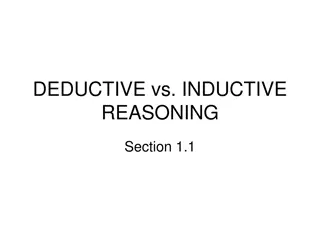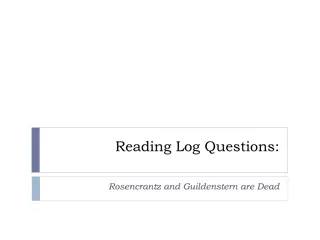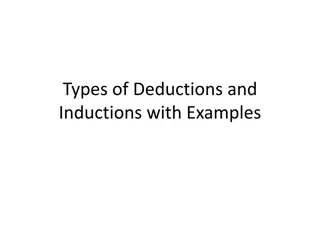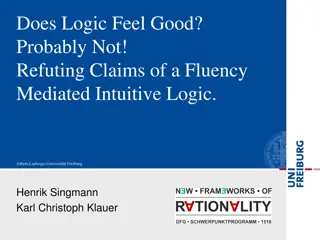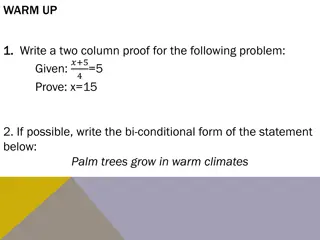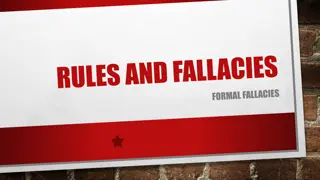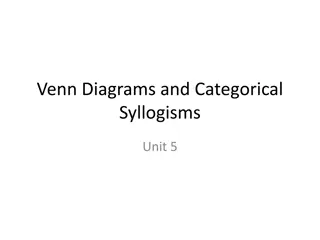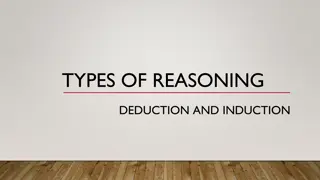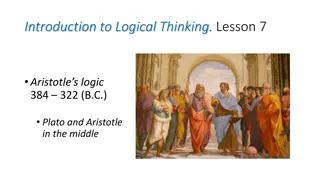Deductive Reasoning and Problem Solving in Logic
Explore the concepts of deductive reasoning, problem-solving logic, and Venn diagrams in this informative content. Learn about the process of drawing conclusions from known facts, using syllogisms to make valid arguments, and understanding the difference between truth and validity in deductive reaso
8 views • 16 slides
Themes and Analysis in Rosencrantz and Guildenstern are Dead
In "Rosencrantz and Guildenstern are Dead," various literary devices such as irony, verbal humor, and syllogisms are utilized to convey the complex themes of fate, identity, and the nature of reality. The characters of Rosencrantz and Guildenstern are explored with a spotlight on their distinguishin
2 views • 20 slides
Deductive and Inductive Reasoning
Explore the world of deductive and inductive arguments through examples of deductive reasoning based on definitions and math, including categorical syllogisms, hypothetical syllogisms, and disjunctive syllogisms. Delve into inductive reasoning and the key distinctions between deductive and inductive
1 views • 26 slides
Deductive Reasoning and Intuitive Logic
Deductive reasoning involves assessing the validity of arguments based on premises, while fluency-mediated intuitive logic suggests people have an intuitive sense of logicality. Challenges arise in drawing correct conclusions from abstract syllogisms, indicating a need for deliberate and effortful p
1 views • 24 slides
Logic in Mathematics and Deductive Reasoning
Delve into the principles of logical deduction in mathematics through examples of conditional statements, syllogisms, and proofs. Explore how deductive reasoning can lead to valid conclusions based on given premises.
0 views • 12 slides
Rules and Fallacies in Valid Syllogisms
Valid syllogisms must adhere to specific rules to avoid committing formal fallacies. These rules include distribution, quality, and quantity concepts. Breaking these rules can lead to fallacies such as undistributed middle, illicit major, and illicit minor. Examples are provided to illustrate these
1 views • 18 slides
Venn Diagrams and Categorical Syllogisms
Venn diagrams, introduced by John Venn, visually represent relationships between different classes. Shading in diagrams signifies empty sets or no overlap between classes. Different types of categorical statements such as universal and particular are illustrated using examples. Explore how Venn diag
0 views • 30 slides
TYPES OF REASONING DEDUCTION AND INDUCTION
Reasoning involves a connected sequence of thoughts leading to a conclusion. Deductive reasoning moves from general to specific, identifying assumptions and hidden premises. Categorical syllogisms demonstrate valid and sound argument structures, while real-life arguments may require uncovering assum
0 views • 21 slides
Critical Thinking, Hypotheses, and Arguments
Explore the concepts of critical thinking, hypotheses, and arguments in this informative content. Learn about the definition of hypotheses, the nature of arguments, and syllogisms. Delve into the world of logical reasoning and the foundations of thought processes.
0 views • 32 slides
Categorical Syllogisms: Types and Examples
A categorical syllogism is a deductive argument based on the relations of classes (categories) where a conclusion is drawn from two premises involving three terms. In standard form, the premises and conclusion are in categorical form (A, E, I, O), each term occurs twice, and the middle term does not
0 views • 27 slides
Deductive Reasoning: Logical Conclusions & Syllogisms
Explore deductive reasoning with examples of logical conclusions using the Law of Detachment and Law of Syllogism. Learn to draw conclusions based on given information about angles, figures, and relationships. Enhance your problem-solving skills in geometry and logic.
0 views • 10 slides
Understanding Aristotle's Logic in Ancient Greek Philosophy
Explore Aristotle's contributions to logic in Ancient Greece, including his examination of syllogisms, predicate propositions, and the development of Aristotelian logic. Learn about the foundational concepts and principles that shaped Western logic for centuries.
0 views • 29 slides
